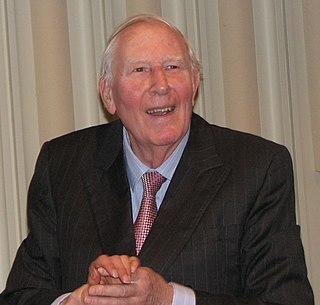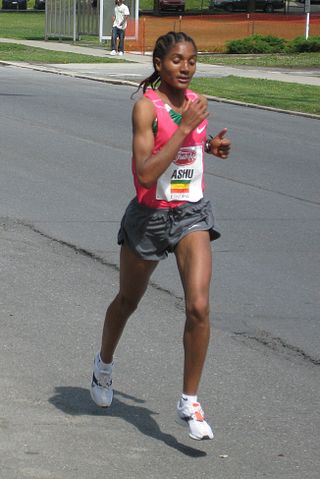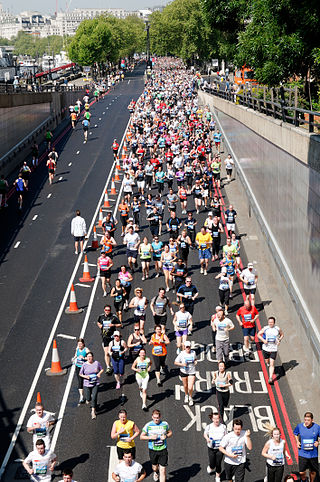
Athletics is a group of sporting events that involves competitive running, jumping and throwing. The most common types of athletics competitions are track and field, road running, cross-country running, and racewalking.

Circumnavigation is the complete navigation around an entire island, continent, or astronomical body. This article focuses on the circumnavigation of Earth.

Sir Roger Gilbert Bannister was an English neurologist and middle-distance athlete who ran the first sub-4-minute mile.

World records in the marathon are ratified by World Athletics, the international governing body for the sport of athletics.

The 1500 metres or 1,500-metre run is the foremost middle distance track event in athletics. The distance has been contested at the Summer Olympics since 1896 and the World Championships in Athletics since 1983. It is equivalent to 1.5 kilometers or approximately 15⁄16 miles. The event is closely associated with its slightly longer cousin, the mile race, from which it derives its nickname "the metric mile".
Jesper Olsen, or Jesper Kenn Olsen, is a multiple national record holder ultra distance runner from Denmark, and was the second person verified to have run around the world, as well as the first verified to have run around the world in a north-south rather than east-west direction.

Paul Richard Cummings was a world-class middle and long distance runner who ran competitively from the 1,500 meters to the marathon, breaking several American records and one world record. His ability to have a middle distance runner's kick and also have the stamina to compete in distances up to the marathon place him as one of the most versatile American track and road racers of his era.

Robert Garside, calling himself The Runningman, is a British runner who is credited by Guinness World Records as the first person to run around the world. Garside began his record-setting run following two aborted attempts from Cape Town, South Africa and London, England. Garside set off from New Delhi, India on 20 October 1997, completing his run back at the same point on 13 June 2003.
The Transglobe Expedition (1979–1982) was the first expedition to make a longitudinal (north–south) circumnavigation of the Earth using only surface transport. British adventurer Sir Ranulph Fiennes led a team, including Oliver Shepard and Charles R. Burton, that attempted to follow the Greenwich meridian over both land and water. They began in Greenwich in the United Kingdom in September 1979 and travelled south, arriving at the South Pole on 15 December 1980. Over the next 14 months, they travelled north, reaching the North Pole on 11 April 1982. Travelling south once more, they arrived again in Greenwich on 29 August 1982. It required traversing both of the poles and the use of boats in some places. Oliver Shepard took part in the Antarctic leg of the expedition. Ginny Fiennes handled all communications between the land team and their support, and ran the polar bases.

Ashu Kasim Rabo is an Ethiopian long-distance runner who specialises in the half marathon and marathon events. Her personal bests are 68:56 minutes and 2:23:09 hours, respectively.

The 10K run is a long-distance road running competition over a distance of ten kilometres. Also referred to as the 10K road race, 10 km, or simply 10K, it is one of the most common types of road running event, alongside the shorter 5K and longer half marathon and marathon. It is usually distinguished from the 10,000 metres track running event by stating the distance in kilometres, rather than metres.
The fastest known time (FKT) for circumnavigation of the globe by bicycle is awarded for completing a continuous journey around the globe by bicycle and other means, consisting of a minimum 29,000 km in total distance cycled.

The 5K run is a long-distance road running competition over a distance of five kilometres (3.107 mi). Also referred to as the 5K road race, 5 km, or simply 5K, it is the shortest of the most common road running distances. It is usually distinguished from the 5000 metres track running event by stating the distance in kilometres, rather than metres.
The IAAF World Road Relay Championships was a biennial international athletics competition in long-distance relay running. First organised by the International Association of Athletics Federations (IAAF) in 1992, the championship ran for four editions, with its last one occurring in 1998.

Jacquelyn Camille Herron is an American ultramarathon runner and scientist. She has 12 world records in ultramarathon distances.
The Sanlam Cape Town Marathon is a City Marathon (42.2 km) held in Cape Town, South Africa, first held in its current form in 2007. Available distances include the marathon, a 10K, a 5K, and two trail runs of length 22 km and 12 km. The marathon is held on a fast and flat course, starting and finishing in Green Point, near the Cape Town Stadium.
Sufiya Sufi is an Indian sprint athlete from Ajmer, Rajasthan. She is the first female runner to complete Manali to Leh Ultramarathon in 2021.

Russell Cook, also known as Hardest Geezer, is an English endurance athlete from Worthing, West Sussex. In April 2024, Cook became the first person to run the entire length of Africa from the southernmost to the northernmost point of the continent as part of Project Africa.












